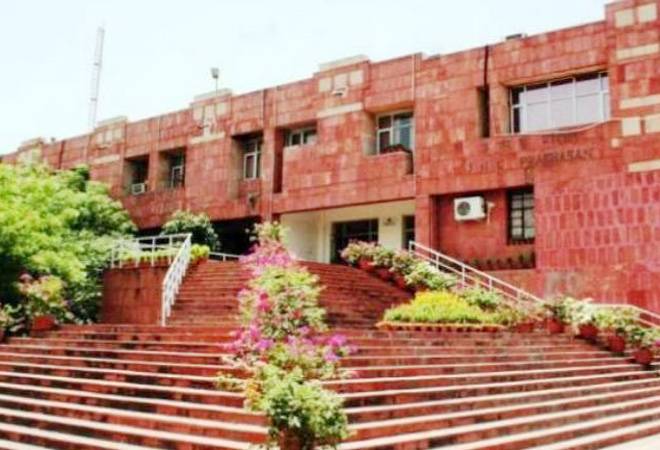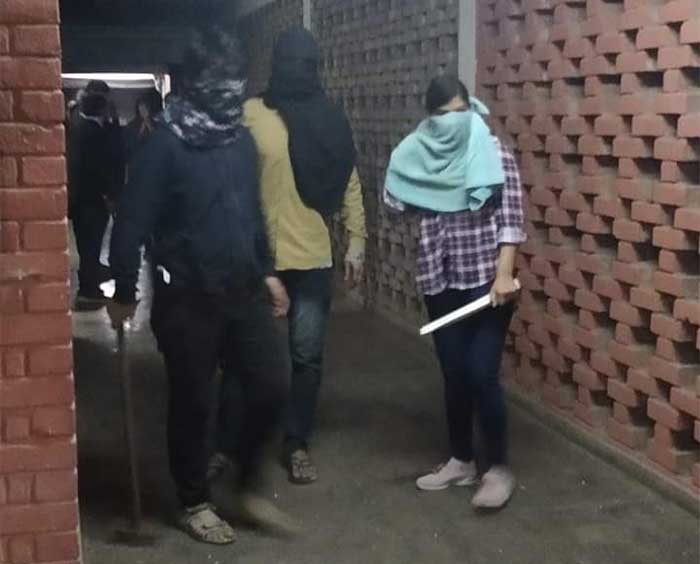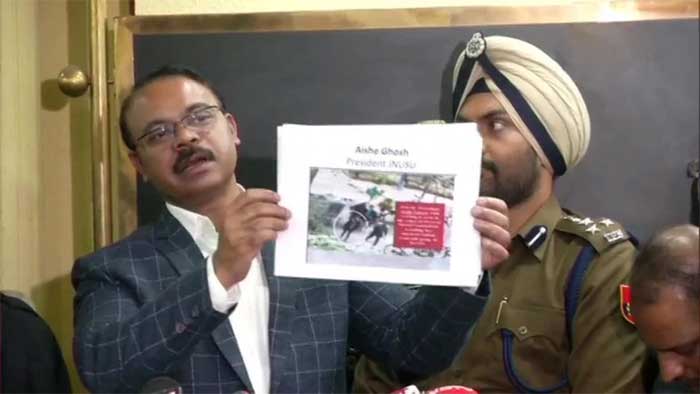
Writing some month ago in a Bengali daily about, among other things, his stint as a security adviser to the vice-chancellor of Jawaharlal Nehru University from 1999 to 2004 , Debanjan Chakraborty recalled an incident in April 1999 when a large mob was seen scouring the campus looking for the office-bearers of the university students union. From time to time, they could be heard shouting, ‘Jai Sri Ram’, and threatening that “JNU would be turned into Indonesia” and that they would “bathe in the blood of the Leftists”.
Chakraborty mentions how he, along with just a handful of the security staff, was able to contain the mob that day which, he says on hindsight, was possible because there was no interference in the affairs of the university by the then home minister, Lalkrishna Advani. Chakraborty, who had joined the JNU administration on the personal request of Mr Advani, was an expert at controlling large violent crowds, having served in Ayodhya and other similar flashpoints in a career spanning more than twenty years till then.
But, the writer regreted, that this time the story was quite different with accounts emerging from many corners of how, on January 5, the JNU security staff were hands-in-glove with masked, armed attackers who wrecked havoc on the Sabarmati hostel for women and many of its inmates.
On the fifty-fifth anniversary this year of the coup in Indonesia, it could well be that the RSS-indoctrinated members of the JNU unit of the Akhil Bharatiya Vidyarthy Parishad(ABVP) would be mouthing the same venomous threats that their elder ideological siblings had done two decades earlier. The ideological lines separating the Left from the extreme Right were, perhaps, never so starkly clear in JNU as they are today. With a home minister determined to take control of the situation in JNU and , additionally, using what looks like a lumpenised Delhi Police to the advantage of the ABVP, the university’s hyper-nationalist students and teachers are, clearly, feeling emboldened to commit varied acts of arson and violence. Amit Shah is someone whom they can depend on to get away with anything. The lying and cowardly vice-chancellor, M. Jagadeesh Kumar is but an insignificant creature of the unduly belligerent home minister’s making.
However, it would be a mistake to think that the BJP-RSS and their countless front organizations covering practically the entire spectrum of Indian life and endeavour are the only ones to harbor deep animosities against Leftists or, for that matter, liberals with socialist tendencies, or even the mildest of freethinkers. In word and deed, the chief minister of West Bengal, Mamata Banerjee has repeatedly proved that she is second to none when it comes to spewing venom against communists, be it the CPI (M), the SUCI or the Naxalites, blithely ignorant of the divergences separating one group from another. In recent days, especially, she has conducted herself in a manner that has given rise to doubts in many minds about the sincerity of her vocal public opposition to the BJP.
On the subject of the West Bengal chief minister’s strong allergy to communists, the mind travels back to the 19th Kolkata Film Festival in 2013 with a retrospective devoted to the foremost Indonesian director, Garin Nugroho serving as one of its highlights. What intrigued many viewers was the exclusion of a film call The Poet, about which Nugroho is on record that he made it with the intention of fighting amnesia; that the motive was to ensure that his countrymen, as well as people of other lands, remembered the two million victims of the pogrom engineered by western agencies combined with religious fundamentalists at home.
Many viewers had the feeling that the Trinamool Congress did not want viewers to be informed of the proud histories of struggle and sacrifice by millions of Indonesian communists, one of them being the real-life poet Ibrahim Kader who survived the massacre and went on to speak, recite and sing his sad memories of friends tortured, shot, hanged, or done to death by the machete. The fear, if any, in the minds of the chief minister’s men may well have been that the film, in a limited but telling way, would take some of the steam out of the accusations heaped on the local Reds on a daily basis by her and her trusted associates, which included a minister who publicly likened communists to cobras that needed to be scotched wherever found. Needless to emphasise this is of a piece with the politics of the president of the West Bengal unit of the BJP who favours the idea of leftists and other dissidents being shot like dogs.
As chance would have it, some three months after the screening of the curtailed Nugroho retro, Nandan, the West Bengal film centre, was the venue of a long documentary on the 1965 annihilation in Indonesia. The film’s director, John Oppenheimer, claimed to have “worked for over a decade with militias, death squads and their victims to explore the relationship between political violence and the public imagination”. The film called The Act of Killing (2012), was acclaimed and awarded at many festivals in the western world. But an international jury, headed by Anand Patwardhan, refused to give it any prize at the 2014 edition of the Mumbai international film festival on account of its distorted politics which seemed to suggest that the Indonesian killings were a fall-out of a civil war between political adversaries rather than what they actually were – a coup masterminded and bankrolled by the CIA, and executed by the Indonesian army and sections of the civilian population represented by nationalist extremists and fundamentalist clerics.
More than five decades after the coup, films like The Act of Killing are still engaged in continuing to promote the lie that it was, to quote Patwardhan “a case of brown man killing brown man when in fact, it was a western conspiracy to foist a military dictator (Suharto) on Indonesia”. In this connection, it is chilling to remember that eight years later, the same western powers were to carry out a similar operation in Chile where a democratically-elected Marxist, Salvador Allende, was killed along with thousands of Allendistas to pave the way for a military dictator called Pinochet.
So, it is hardly surprising that Oppenheimer’s documentary, complete with hours of reconstructed killings showing the bestialities that oriental savages are supposedly easily capable of, should have been highly thought of in the West. Again, it is doubtful whether the film would have been rejected the way it was at MIFF if someone other than the redoubtable Patwardhan had been the chairman of the jury.
Debanjan Chakraborty’s recollection of the day when extreme rightists were heard issuing threats that they would replicate Indonesia (of 1965) on the JNU campus, should fill us with dread about what perhaps awaits not just this great seat of learning and questioning, but all of us who cherish the values that make for our secular democracy, and take pride in our Republican Constitution. Should we read the deep gash on Aishe Ghosh’s forehead, requiring no less than sixteen stitches, as a premonition of far worse tragedies to follow? Or should we, instead of allowing the goons to force us into a corner, continue with our determined nationwide peaceful resistance?
( Vidyarthy Chatterjee writes on cinema,society, and politics.)
SIGN UP FOR COUNTERCURRENTS DAILY NEWSLETTER













































